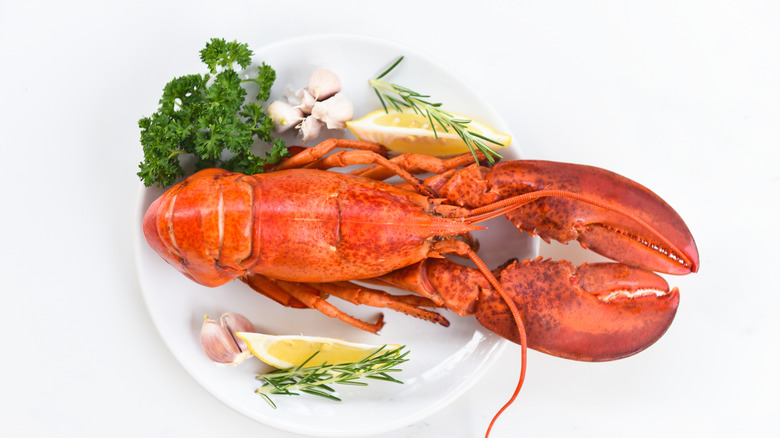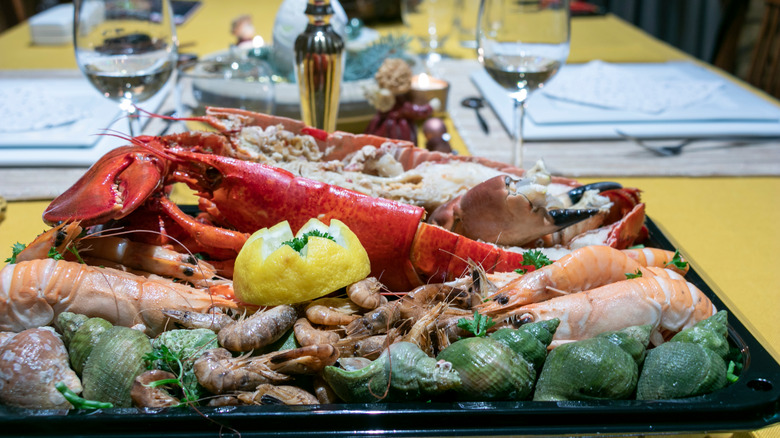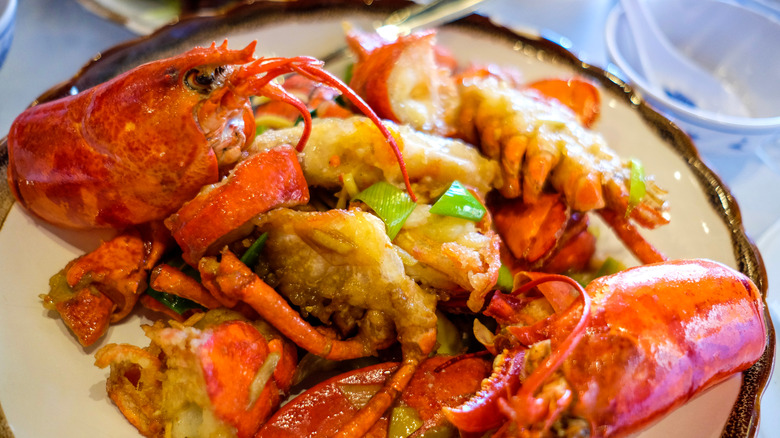Why Some Think It's Bad Luck To Eat Lobster On New Year's Eve
Have you got your New Year's Eve dinner all planned out? If you're still in your hard-partying youth, you may be thinking, "Yeah, Jägerbombs with a champagne chaser!" Meanwhile, older folks, for whom buying alcohol legally is no longer a novelty, will likely have plans that involve actual food. While we're still up for sparkling wine-fueled midnight revelry, we like to precede it with an actual sit-down meal or a nice buffet spread instead of settling for a handful of chips or a pizza that mysteriously arrives after someone drunk-dials Domino's.
As we usher in the New Year, we do so with a whole host of traditions based on superstition, all with the basic theme, "Begin as you mean to go on." Some foods are thought to bring sufficient luck to see us through another 12 months: Black-eyed peas, most famously, are eaten to bring wealth, while 12 grapes eaten at midnight on New Year's are meant to bring good luck for each month of the year. Lemon pigs, uhh ... help us start the year with a dose of weird-yet-fun kitschiness. Other foods, however, are avoided for the opposite reason as they are thought to bring bad luck. This list, as the title may have tipped you off, does include lobster – bad news for those who want to ring in the year with an ultra-luxurious meal. Best to stick to wagyu beef and caviar instead, and maybe save the lobster for January 2.
You don't want to begin the year looking backward
The problem with lobsters, symbolically speaking, is the fact that they move backwards. This is what informs the superstition, which is particularly prevalent in central and Eastern Europe. that eating them as the year begins might lead to you experiencing similar retrograde motion. This prohibition against lobster for New Year's feasting extends to certain other types of seafood as well. Both crab and shrimp are also considered unlucky due to their tendency to move sideways — apparently, when entering into a new year, straight ahead is the only way to go. You're also going to want to avoid "bottom feeder" fish such as catfish or halibut, lest you, too, find yourself scrounging for scraps before the year is through.
Fish that tend to swim forward and stay closer to the surface, however, are perfectly safe, so you may go ahead and enjoy that salmon. As a matter of fact, since salmon travel in schools, they are thought to bring prosperity and are considered to be an extra-lucky (as well as heart-healthy) food.
Lobster is also a no-no for Lunar New Year
January 1 isn't the only New Year celebration to take place at the top of the calendar, as within three to six weeks of the date comes Lunar New Year. Once again, if you want to ensure maximum luck in the year to come, it's necessary to watch what you eat and yes, lobster is off the menu here as well. The foods you should be eating for Lunar New Year include sweet rice balls and lion's head meatballs for harmony on the domestic front, noodles for longevity, and dumplings and fish for wealth and fortune, but once again, lobster is verboten due to that same backward-swimming thing.
There are a few other crustaceans that do make the cut, however. Clams are okay to eat during Lunar New Year celebrations as their shells need to be opened up before you can eat them and this may be seen to symbolize exploring new paths in the year to come. Shrimp, too, are a harbinger of good luck and joyful tidings.


